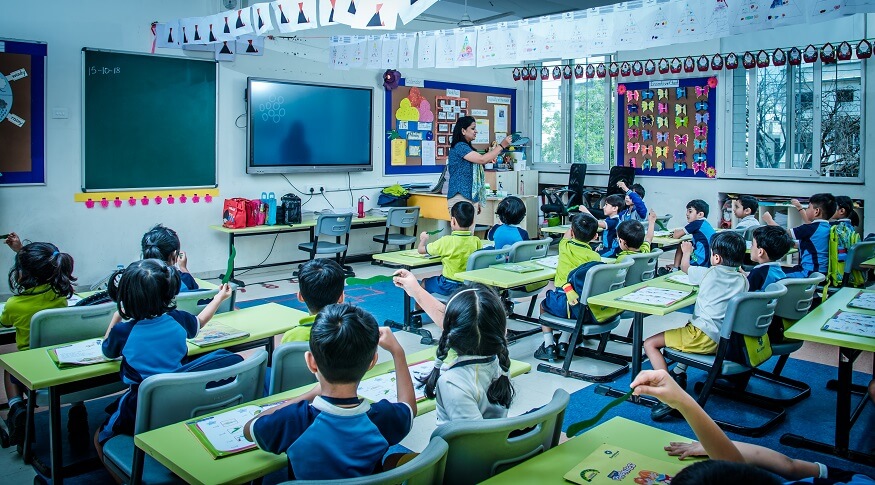Going to school every day is similar to practising a sport or an instrument: the harder you work out, the greater you get. Regular attendance teaches students the importance of commitment and discipline, punctuality which are essential skills for success in school and later in life and also allows students to consistently engage in classroom learning, understand concepts, and participate in discussions and activities that build their knowledge and skills.
Attendance for school students refers to the act of being present and physically attending school on a regular basis. It is an essential part of a student’s academic journey since it has a direct influence on their learning, involvement, examination and overall achievement. Attendance is typically recorded daily and monitored by the school administration to ensure students are actively engaged in their education.
Benefits And Importance of Attendance in School:
Regular schools’ attendance brings forth a myriad of benefits and holds significant importance in a student’s educational journey. Here are some key points to explain the importance of attendance
Academic Success:
Attending school consistently provides students with the opportunity to actively participate in classroom activities, engage in discussions, and receive direct instruction from teachers. This active involvement aids in a better understanding of concepts, improves academic performance, and enhances overall learning outcomes.
Knowledge Acquisition:
Schools’ attendance ensures that students have access to a structured learning environment where they can acquire knowledge across various subjects. Regular attendance allows students to follow the curriculum, learn new concepts, and be updated on educational subjects.
Skill Development:
Schools’ attendance plays a vital role in the development of essential life skills. By attending school regularly, students learn discipline, time management, responsibility, teamwork, and critical thinking. These skills are invaluable and contribute to personal growth, preparing students for future academic and professional endeavours.
Social Interaction:
School is not just a place for learning, yet additionally for social interaction. Regular attendance allows children to interact with their classmates, form connections, and develop social skills. These networks develop a sense of community, empathy, and understanding among students.
Educational Opportunities:
Schools offer a multitude of educational opportunities beyond classroom instruction. Field trips, workshops, extracurricular activities, and special events enhance the overall learning experience. Regular attendance ensures that students can participate in these opportunities, broadening their horizons and exposing them to diverse learning experiences.
Continuity of Learning:
Consistent attendance promotes continuity in learning. Each day builds upon the previous one, and missing school can result in gaps in knowledge. Regular attendance ensures students can progress smoothly through the curriculum without missing crucial information.
Preparation for the Future:
Schools’ attendance cultivates habits necessary for success in the future. Punctuality, reliability, and commitment are traits valued by employers and higher education institutions. Regular attendance instils these qualities, preparing students for the demands of the professional world.
Compliance with Legal Requirements:
Attendance in school is often mandated by law, ensuring that children receive a proper education. Regular attendance demonstrates compliance with these legal requirements, avoiding potential consequences for students and their families.
Key Points to Improving Attendance in Primary Schools:
Creating a Positive School Environment:
Foster a welcoming and inclusive school culture where students feel valued and motivated to attend. Encourage strong relationships between staff, students, and parents, promoting a sense of belonging and engagement.
Communication and Engagement:
Maintain regular and open communication with parents/guardians to keep them informed about the importance of attendance. Engage parents through newsletters, meetings, and workshops, highlighting the benefits of consistent attendance for their child’s academic success.
Attendance Tracking and Early Intervention:
Implement a robust attendance tracking system to monitor student attendance patterns. Identify students with chronic absenteeism or at-risk attendance early on and provide timely interventions, such as personalized support plans, counselling services, or mentorship programs.
Recognizing and Celebrating Attendance:
By improving attendance in primary schools, we can Acknowledge and celebrate good attendance with incentives, rewards, and recognition programs. Create a positive reinforcement system that motivates and reinforces the habit of regular student attendance.
Key Points to Improving Attendance in Secondary Schools:
Relevant and Engaging Curriculum:
Design a curriculum that connects with the interests and aspirations of secondary school students. Offer a range of subjects, extracurricular activities, and vocational programs that provide students with meaningful and engaging learning experiences, encouraging regular attendance.
Personalized Support:
Identify and address individual barriers to attendance. Support students with emotional and educational services such as teaching, supervision, and consulting to ensure they have the resources they need to overcome obstacles that may result in an absence.
Student Involvement and Responsibility:
Integrate students in the decision-making process, giving them a say in how their educational experience is. Provide opportunities for leadership, student groups, and projects that encourage active participation, creating a sense of ownership and responsibility for their attendance.
Collaborative Approach:
By improving attendance in secondary schools, we can emphasise fostering collaboration among teachers, administrators, and support staff to address school student attendance issues collectively. Regularly review and analyse attendance data to identify trends, implement targeted strategies, and allocate resources effectively to improve overall attendance rates.
Challenges:
Learning gaps:
According to the school student attendance who miss out on primary and secondary school have considerable learning gaps because they lose out on important lessons and educational experiences.
Difficulty understanding ideas:
Poor attendance makes it difficult for pupils to acquire and understand basic topics, resulting in a weaker foundation for future learning.
Poor academic performance:
Due to missed classes and incomplete understanding of subjects, students face difficulties in keeping up with the curriculum, resulting in lower grades.
Social exclusion:
Irregular attendance can lead to social exclusion since kids lose out on interactions with their classmates, making it difficult for them to acquire social skills and make connections.
Limited teacher support:
Students who are frequently absent receive limited teacher support and individual attention, making it harder for them to clarify doubts or seek additional help.
Emotional and psychological impact:
A lack of attendance can lead to emotions of frustration, worry, and separation from the school community, all of which can have a severe influence on mental health.
Increased dropout risk:
Students who repeatedly miss school are more likely to drop out, robbing them of vital education and restricting their future chances.
Conclusion:
At EuroSchool, we understand that the importance of attendance in school cannot be understated. Teachers, parents, and society as an entire need to give attention to and highlight the importance of regular schools’ attendance. Students who attend school regularly are better able to achieve good grades, develop a strong basis for learning, and build up the skills needed for future activities.










